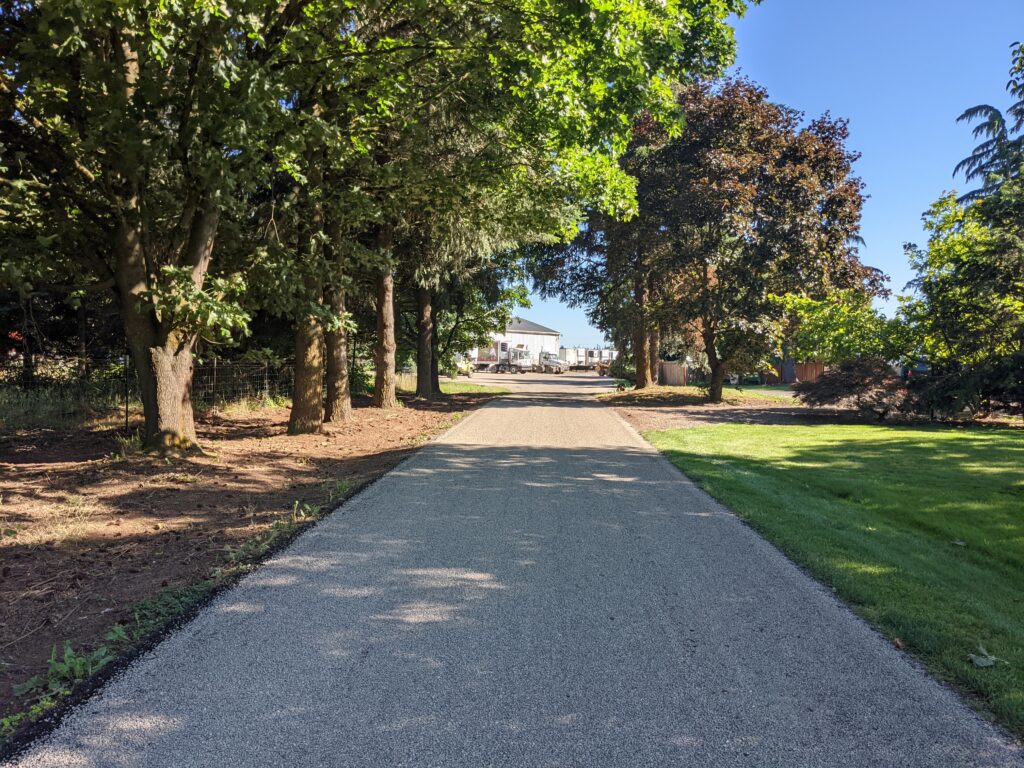Why Choose a Chip Seal Driveway for Your Home?
When it comes to maintaining or upgrading your driveway, you’ve likely considered several options. Among them, a chip seal driveway stands out as a practical and cost-effective choice. Whether you have an aging asphalt driveway or a gravel one that’s ready for a solid surface, chip seal offers unique advantages that can extend the life of your pavement or create you a hard driving surface. So, why should you consider this method? Let’s dive into the benefits and explore how it works.
What Is a Chip Seal Driveway?
First, let’s clarify what chip seal is. Chip Seal Paving is one of the oldest forms of paving driveways and roads. Chip seal is a paving technique that combines a layer of asphalt emulsion with a topping of small, crushed stones. This mixture is spread over your existing driveway surface, creating a durable and textured finish. For homeowners looking to protect their asphalt or upgrade a gravel base, a chip seal driveway provides a budget-friendly solution with impressive results. If chip sealing a driveway or road over gravel you will need to have at least two layers of chip seal or tar and chip installed.

Advantages of Chip Seal for Your Driveway
One of the biggest reasons people choose a chip seal driveway is its ability to extend the life of existing pavement. If your asphalt is starting to show signs of wear—like cracks or fading—chip seal acts as a protective shield. By sealing the surface, it prevents water from seeping into cracks, which can worsen damage over time. Plus, it adds an extra layer of durability (wear layer) to withstand heavy traffic and harsh weather.
Another perk is cost savings. Compared to a full asphalt replacement, chip seal is far more affordable. It uses fewer materials and requires less labor, making it an attractive option for homeowners on a budget. Additionally, for those with gravel driveways, chip seal transforms the loose stones into a solid surface without the high cost of paving with new asphalt or concrete.
Beyond protection and price, a chip seal driveway offers excellent (you don’t want to fall on it) skid resistance. The crushed stone layer provides extra grip, which is especially helpful in wet or icy conditions. As a result, you get a safer driveway for vehicles and foot traffic alike.
Why Chip Seal Over Other Options?
Now, you might wonder why chip seal stands out over alternatives like repaving or sticking with gravel. For starters, it’s quick to apply. The process typically takes just a day or two, meaning less disruption to your routine. In contrast, a full asphalt overlay or concrete pour can take much longer and cost significantly more.
Moreover, chip seal is versatile. It works wonders on both asphalt and gravel surfaces, adapting to whatever base you’re starting with. If your goal is to extend the life of your asphalt or create a stable surface over gravel, a chip seal driveway checks all the boxes. It’s a middle-ground solution that delivers durability without breaking the bank.
Boosting Longevity with Fog Seal
Once your chip seal driveway is in place, you can take its longevity even further with a fog seal. So, what’s a fog seal? Essentially, it’s a light application of asphalt emulsion sprayed over the chip seal surface. This extra step locks in the stones, reduces dust, and enhances the driveway’s appearance with a sleek, dark finish.
The benefits of fog seal don’t stop there. By sealing the surface, it adds another layer of protection against UV rays, oxidation, and water damage. Consequently, your driveway stays in top shape for years longer. Plus, it smooths out the texture slightly, making it easier to sweep and maintain. For homeowners who want a low-maintenance, long-lasting chip seal driveway, adding a fog seal is a smart move.
Tar and Chip Driveway vs Chip Seal Driveway
Tar and chip and chip seal are two terms often used interchangeably to describe a popular road surfacing technique that combines layers of asphalt and aggregate to create a durable, cost-effective pavement. While slight regional or technical variations in terminology might exist, they essentially refer to the same process. This method has been widely employed for decades, particularly on rural roads, driveways, and low-traffic areas, offering a practical alternative to traditional asphalt or concrete paving. Understanding their similarities highlights why these terms are synonymous in most contexts.
The process for both tar and chip and chip seal begins with the application of a liquid binder—typically hot tar, asphalt emulsion, or a similar bituminous material—onto an existing surface, such as gravel or an old roadbed. Immediately following this, a layer of uniformly sized stone chips or aggregate is spread over the binder. The stones are then pressed into the binder using a roller, ensuring they adhere properly as the material cools and hardens. This creates a rough, textured surface that provides excellent traction, resists skidding, and protects the underlying structure from weather and wear. Whether called tar and chip or chip seal, the core technique and materials remain consistent.
The confusion between the names often stems from historical or regional preferences. “Tar and chip” emphasizes the use of tar (or a tar-like asphalt product) as the binding agent, paired with the chipped stone, and is a term more commonly heard in older references or certain areas like the United Kingdom. “Chip seal,” on the other hand, is a more modern, technical term favored in the United States, focusing on the sealing effect of the process and the chips of aggregate used. Despite these linguistic differences, the outcome is identical: a single or multiple-layered surface that enhances durability, reduces maintenance costs, and extends the life of the roadway. In essence, tar and chip and chip seal are two sides of the same coin, delivering a practical and economical paving solution.
Final Thoughts
In summary, a chip seal driveway is an excellent choice for anyone looking to extend the life of their asphalt or upgrade a gravel surface. With its affordability, durability, and skid-resistant texture, it’s no wonder this method is gaining popularity. And when paired with a fog seal, you get even more protection and a polished look that lasts.
Ready to give your driveway a new lease on life? Chip seal might just be the perfect solution for you. Contact us at chipseal.net to learn more about how we can transform your pavement today!
Chip Seal Paving Warning!
Don’t get scammed by traveling asphalt paving or chip seal cons. There is no such thing as extra material.
Hear what the BBB has to say about driveway scams. Paving and Chip Seal Scams.

